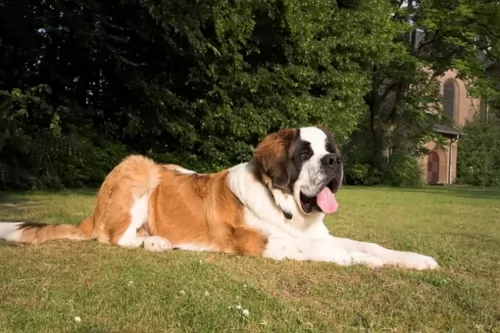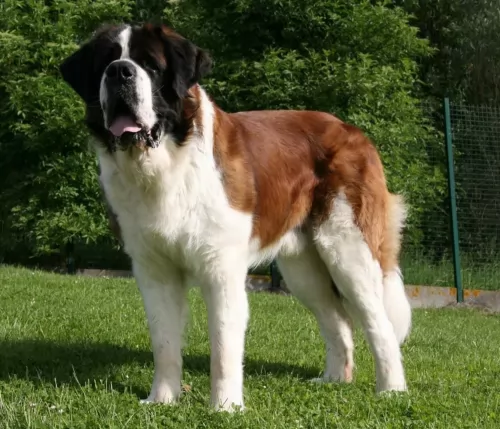 Petzlover
Petzlover Cavapoo is originated from United States but St. Bernard is originated from Switzerland. Cavapoo may grow 38 cm / 14 inches shorter than St. Bernard. Cavapoo may weigh 78 kg / 171 pounds lesser than St. Bernard. Cavapoo may live 5 years more than St. Bernard. Cavapoo may have less litter size than St. Bernard. Cavapoo requires Moderate Maintenance. But St. Bernard requires High Maintenance
Cavapoo is originated from United States but St. Bernard is originated from Switzerland. Cavapoo may grow 38 cm / 14 inches shorter than St. Bernard. Cavapoo may weigh 78 kg / 171 pounds lesser than St. Bernard. Cavapoo may live 5 years more than St. Bernard. Cavapoo may have less litter size than St. Bernard. Cavapoo requires Moderate Maintenance. But St. Bernard requires High Maintenance
 The Cavapoo, known also as the Cavoodle, is a small dog – a mix of a miniature Poodle and a Cavalier King Charles Spaniel.
The Cavapoo, known also as the Cavoodle, is a small dog – a mix of a miniature Poodle and a Cavalier King Charles Spaniel.
He hasn’t got a long history, but each of the dogs he comes from – the Cavalier King Charles Spaniel and the Poodle – have longer histories. The Cavapoo started being bred in the United States, but he has a short history in America. In Australia, they were first bred in the 1990s.
Today, as a hybrid, the Cavapoo isn’t recognized by the American Kennel Club but he is recognized by the American Canine Hybrid Club as well as the Designer Dogs KennelClub.
 The St Bernard breed was once called the Alpine Cattle Dogs or the Alpine Mountain Dogs. They have always been farm dogs and mountain dogs in the French and Swiss Alps. They come from the border land of Switzerland and France. They were herding dogs, hunting, search and rescue, watchdogs and draft dogs.
The St Bernard breed was once called the Alpine Cattle Dogs or the Alpine Mountain Dogs. They have always been farm dogs and mountain dogs in the French and Swiss Alps. They come from the border land of Switzerland and France. They were herding dogs, hunting, search and rescue, watchdogs and draft dogs.
Their ancestors are considered to include the Sennenhunds and molosser breeds that came to the Alps with the ancient Romans. There are four Sennenhund breeds that are believed to have contributed to the original St. Bernard. These included the Greater Swiss Mountain Dog (Grosser Schweizer Sennenhund), the Appenzeller (Appenzeller Sennenhund), the Bernese Mountain Dog (Berner Sennenhund) and the Entlebucher Mountain Dog (Entlebucher Sennenhund) Today the St. Bernard is considered a Molossoid breed.
The first we know of the St. Bernard in any written records was in 1707 at the Great St. Bernard Pass and Great St. Bernard Hospice run by monks. There were found paintings of the dogs dating back into the late 1600’s. It is told that Barry saved upward of 100 people in the St. Bernard pass, and it is from these stories that the dogs gained their snow rescue reputation.
The St. Bernard of that time did not look like the St. Bernard does today as there was much crossbreeding. Many dogs dies during rescues in the avalanches of the mid 1800’s and so they Saint was crossed with the Newfoundland to preserve the breed. You can today see the resemblance in the build and looks of the two breeds. This cross brought about the long haired St. Bernard whose fur was too heavy for rescues.
The St. Bernards of mountain rescue fame were only about the size of a German Shepherd dog and were short haired. After crossing with the Newfoundland and moving into clubs and dogs shows, they have been bred to be much larger. Before the stud book was closed, it is thought that many larger breeds such as the Greater Swiss Mountain Dog, the English Mastiff, the Tibetan Mastiff, the Rottweiler, the Great Pyrenees, the English Bulldog, the Great Dane, the Bernese Mountain Dog, the Boxer and the Caucasian Oycharka all contributed to today’s St. Bernard.
In 1884 The Swiss St. Bernard Club was founded and the breed entered the Swiss Stud book as its first entry in 1884. It was 1888 when the standard was approved and the breed became the national dog of Switzerland. Before the name St. Bernard came to be common, these dogs might be called, Barry Dogs, Alepnmastiff, Noble Steeds or Saint Dogs.
The dogs came to England in the early 1800s and to the United States soon after. They were recognized by the European kennel clubs first and by the early 1900’s they were the most popular breed in the AKC.
 The Cavapoo can be found in different colors and he can be blonde, white, brown, white or black or even tri-colored. Sometimes the coat can be a little bit curly but it can also sometimes be a long, silky coat from the Cavalier.
The Cavapoo can be found in different colors and he can be blonde, white, brown, white or black or even tri-colored. Sometimes the coat can be a little bit curly but it can also sometimes be a long, silky coat from the Cavalier.
Dogs crossed with poodles, such as the Cavapoo, are known to be hypoallergenic, but there is really no 100% guarantee that he will be hypoallergenic.He has a round face with large, brown eyes and long ears. He can adapt easily to life in the city or in the countryside.
The Cavapoo is a small dog breed that has been bred to be an amicable pet. He gets along well with adults and children as well as other pets in the home. He stands about 28–33cm in height and can weigh anything from 5 to 12 kg.
He is an intelligent little dog, alert and inquisitive. Even a small, non-aggressive dog such as the Cavapoo can do well with training and socialization as he is quick to learn. With this socialization he becomes an obedient, affectionate, well behaved 4-legged family member.
Loyal and friendly, the Cavapoo thrives on human companionship and he just loves to be involved in everything the family is getting up to. He isn’t a dog that can be left on his own too long as this is when he develops irritating behavior patterns such as ongoing yapping and barking.
 Today’s St. Bernard is not a large dog, he is a giant dog. Weighing in at 140-200 pounds and standing 28 to 35 inches tall, he is a lot of dog. Bred with mastiffs and large mountain dogs, they have proportional and powerful build. They are strong, sturdy and well muscled. They have either a smooth or rough (short or long) coat. Their eyes are brown or occasionally blue. They have tight lids, and square heads and muzzles.
Today’s St. Bernard is not a large dog, he is a giant dog. Weighing in at 140-200 pounds and standing 28 to 35 inches tall, he is a lot of dog. Bred with mastiffs and large mountain dogs, they have proportional and powerful build. They are strong, sturdy and well muscled. They have either a smooth or rough (short or long) coat. Their eyes are brown or occasionally blue. They have tight lids, and square heads and muzzles.
There are two coat types called smooth and rough, or short and long. The smooth shorter coat is tough, flat and close against the body and the long, rough coat is dense, wavy and heavy around the legs, neck and ruff. Both types have long tails that hang low and are heavy. Saints are known to slobber, drool and snore.
 Pet lovers who welcome a Cavapoo into their home aren’t going to be disappointed if they stick to their side of the bargain and provide their pet with lots of love and care.
Pet lovers who welcome a Cavapoo into their home aren’t going to be disappointed if they stick to their side of the bargain and provide their pet with lots of love and care.
The Cavapoo suits any kind of family because he is playful, loving, loyal and comes with a balanced and amicable personality.
Keep him happy with good food, clean water and lots of your attention and he’ll respond by being the perfect companion for you.
 3.Adaptability no - these are giant dogs that need a lot of room. A large fenced yard or farm is best. They won’t do well in an apartment. They need exercise every day and loping around a yard is very good for them. They love to play in the snow, carry a backpack or pull a cart. They love to have a “job”
3.Adaptability no - these are giant dogs that need a lot of room. A large fenced yard or farm is best. They won’t do well in an apartment. They need exercise every day and loping around a yard is very good for them. They love to play in the snow, carry a backpack or pull a cart. They love to have a “job”
4.Learning ability – They are smart and highly trainable if motivated. They may appear lazy but they are just laid back and need a motivation.
 The Cavapoo is considered a healthy little dog who is active and energetic. Because he is a hybrid, he could develop illnesses associated with either of the dog types he comes from. However this is highly unlikely and you can expect up to 15 years from your Cavapoo if you feed him correctly and shower him with lots of love and attention.
The Cavapoo is considered a healthy little dog who is active and energetic. Because he is a hybrid, he could develop illnesses associated with either of the dog types he comes from. However this is highly unlikely and you can expect up to 15 years from your Cavapoo if you feed him correctly and shower him with lots of love and attention.
Dogs with long, floppy ears tend to be more prone to ear infections. You’ll have cause for concern when you see your dog scratching his ears or shaking his head. There are one or two reasons why your Cavapoo may get an ear infection, and food allergies could be one.
A food allergy can bring about inflammation that can lead to infections. Moisture and excessive wax can also cause an ear infection. You can use cotton wool and some ear cleaner to remove dirt and moisture, but if in any doubt, speak to your vet or get your pet to the vet for advice.
Small dogs are more prone to dental disease, and your Cavapoo’s teeth should be brushed 2 or 3 times a week with a vet-approved special dog toothpaste and brush. This can prevent dental decay which can bring about a whole lot of problems with his teeth but also with other parts of the body.
 The first problem this breed faces is how fast they grow and gain weight. This can lead to serious health issues if not controlled. Their bones can be damaged by this excessively fast rate of growth. Other issues facing the breed include:
The first problem this breed faces is how fast they grow and gain weight. This can lead to serious health issues if not controlled. Their bones can be damaged by this excessively fast rate of growth. Other issues facing the breed include:
 The Cavapoo doesn’t shed much so he won’t need that much grooming, although there are people who take him to a doggy parlor to see that the hair is trimmed into shape. If not, then a good brushing twice a week will ensure the hair doesn’t matt and that it remains free of lots of dead hair.
The Cavapoo doesn’t shed much so he won’t need that much grooming, although there are people who take him to a doggy parlor to see that the hair is trimmed into shape. If not, then a good brushing twice a week will ensure the hair doesn’t matt and that it remains free of lots of dead hair.
With any dog, and not just the Cavapoo, you want a food that boosts energy and promotes longevity. The Cavapoo breed is energetic and lively, and it is this stamina of his that will require you feeding him top quality food that is rich in nutrients.
Small dogs have a higher calorie need than large dogs because their metabolisms are much faster. Protein and fat are important nutrients for small-breed dogs and these nutrients need to come from high-quality sources. Speak to your vet about the best food for your Cavapoo and always ensure that he has a bowl of clean water available.
 1.Feeding the puppy – You want to control their growth. Do not overfeed, and make sure they exercise but not too much. Feed a high quality large breed puppy food 3-4 X a day in small amounts.
1.Feeding the puppy – You want to control their growth. Do not overfeed, and make sure they exercise but not too much. Feed a high quality large breed puppy food 3-4 X a day in small amounts.
2.Feeding the adult – The problem you face with he adult St. Bernard is the potential for Bloat. Don’t over feed. Don’t feed before or after strenuous exercise. Feed 2-3 X a day in smaller amounts to prevent Bloat. Feed a high quality breed specific food if possible or an extra large breed formula.
4. Games and Exercises They need exercise but not as much as you might think. The St. Bernard is a laid back lumbering character so don’t over exercise her. They enjoy weight and cart pulling but they are not athletes who enjoy frisbee or agility. Search and rescue trials and tracking trials are perfect athletic endeavors for them.